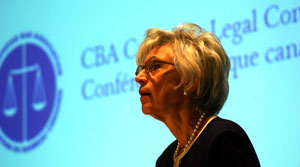CALGARY - The cost of accessing legal services and the length of trials in Canada continue to place a strain on access to justice in both the criminal and civil justice systems, although legal stakeholders have started to work together on improving the problem, says Supreme Court Chief Justice Beverley McLachlin.

Speaking at the Canadian Bar Association council meeting in Calgary last week, McLachlin noted that one of the most pressing concerns limiting access to legal services for Canadians is its price tag, which can be prohibitive for many middle income earners.
While wealthy individuals and large corporations have the means to pay for legal services, and the poor have access to legal aid at least for serious criminal charges, says McLachlin, middle income Canadians “are often left with the very difficult choice that if they want access to justice, they must put a second mortgage on their home or use funds set aside for a child’s education or for retirement. The price of justice should not be so dear.”
Partially driven by cost, the issue of self-represented litigants is also placing a burden on the courts, says McLachlin, as are both long criminal and civil trials, including the increased use of expert evidence and more time consuming pre-trial motions and evidentiary questions in criminal trials.
Delays also continue to plague the system, which could result in witnesses being potentially less reliable and long periods of pre-trial custody.
“On the criminal side, delays may result in serious charges being stayed, since the Charter guarantees the right to trial within a reasonable time,” says McLachlin.
McLachlin told the conference she met with outgoing CBA president Parker MacCarthy and other representatives of the association earlier this summer to discuss their concerns about the issue. The result, she noted, was a commitment to work together with other legal stakeholders to improve access to justice across the country.
“The only way to achieve real and lasting results is for the bench, the bar, and government to work together, all in the context of the community which we serve,” says McLachlin.
At its annual meeting last week, the CBA council passed an access to justice resolution to “urge the federal, provincial, and territorial governments to cease using the Canadian justice system as a source of government funding and instead to invest time, money, and energy in the justice system to bring access to justice to the people of Canada.”
As a result, the association plans to push for measures such as a zero GST on legal services, abolishing other taxes on legal services, and fair pay to legal aid lawyers, including those in the federal jurisdiction. The CBA also moved that all justice institutions should be required to provide rooms, facilities, and advertising for lawyers working pro bono for those who can’t afford legal services.
The resolution, which was tabled at the 2006 CBA annual meeting, was brought forward this year on behalf of B.C. litigation lawyer Dugald Christie, who was tragically struck and killed near Sault Ste. Marie, Ont., last year as he cycled across Canada to raise funds for his cause.
Christie’s case against the attorney general of British Columbia on the issue of B.C.’s seven-per-cent tax on legal services and the broader issue of the constitutional entitlement to legal services aided by a lawyer where rights and obligations are at stake before a court or tribunal reached the Supreme Court earlier this year. However, the court ruled in favour of the province, noting that no general constitutional right to counsel exists.
Vancouver lawyer Robin Bajer, who argued the Supreme Court case on behalf of Christie, brought forward the resolution, saying, “The Supreme Court of Canada did not overturn the lower court’s findings of fact that the tax on lawyers’ fees hinders delays and in some cases denies access to justice.
“It is that finding that, as mover of this resolution, I feel demands a response from the profession.”
Concerns raised with the resolution included reducing the GST on legal services to zero, which one speaker said would involve asking the federal government to give up nearly $1 million in tax revenue and would not do anything for the image of lawyers, as fees in other professions, such as accounting, are subject to the tax.
In Ontario, the Ontario Bar Association says it has also reached out to all users of the justice system in identifying barriers to justice and in finding solutions to eliminate or reduce those barriers. This included a series of town-hall meetings and a justice stakeholder summit held earlier this summer, to develop a road map for improvements in this area.

 Speaking at the Canadian Bar Association council meeting in Calgary last week, McLachlin noted that one of the most pressing concerns limiting access to legal services for Canadians is its price tag, which can be prohibitive for many middle income earners.
Speaking at the Canadian Bar Association council meeting in Calgary last week, McLachlin noted that one of the most pressing concerns limiting access to legal services for Canadians is its price tag, which can be prohibitive for many middle income earners.